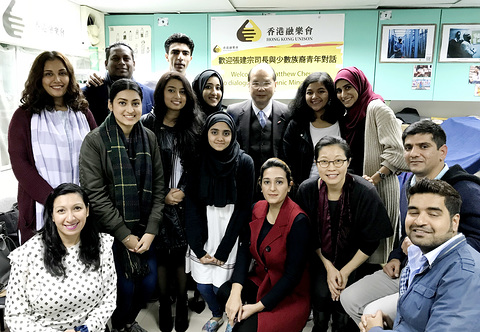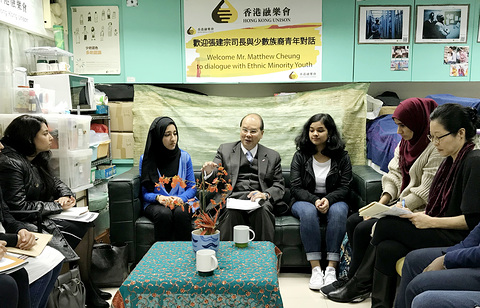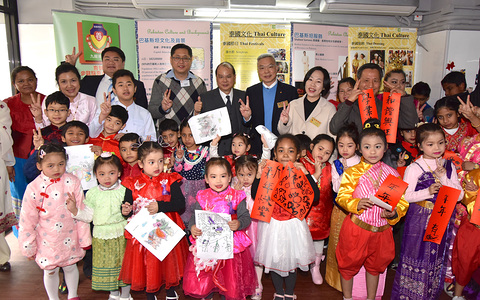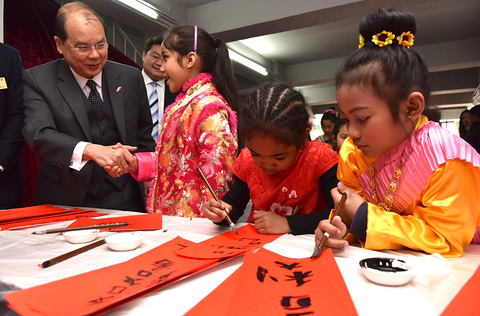Promoting upward mobility of ethnic minorities
11 March 2018
The Budget released last month has put forward a series of relief and benefit measures for the public, including a sum of $500 million earmarked to strengthen support for ethnic minorities to promote their integration and upward mobility in our community.

|

|
Excluding foreign domestic helpers, there are at present about 250 000 ethnic minorities in Hong Kong, representing 3.8% of our population. Many of them have, for generations, made Hong Kong their home since their parents or grandparents settled here decades ago and played a significant role in the history of Hong Kong’s development. The Government has all along been encouraging and helping ethnic minorities who have chosen to stay in Hong Kong to integrate into society and be a member of our big family. That said, some of them have encountered difficulties in adaptation and social integration owing to language barriers and cultural differences. To enhance collaboration within the Government on support for ethnic minorities, I will set up and chair a steering committee to co-ordinate, review and monitor work in this area, for which $500 million has been earmarked in the Budget.
According to the 2016 Population By-census Thematic Report: Youths published last month by the Census and Statistics Department, 1.4% of the youths in Hong Kong were South Asians and 0.5% in 2016 were Whites if analysed by ethnicity. South Asians included Indians, Pakistanis, Nepalese, Bangladeshis and Sri Lankans. It is noteworthy that the population of non-Chinese youths more than doubled from 13 117 (1.5%) in 2006 to 27 651 (3.6%) in 2016.

|
In her Policy Address delivered last year, the Chief Executive stated that with a view to increasing government job opportunities for ethnic minorities, the Civil Service Bureau would conduct a comprehensive review of the entry requirements relating to Chinese proficiency for all the grades of the civil service. The review has been completed. Twenty-two new grades will lower their Chinese language proficiency requirements (LPRs), bringing the number of grades that have lowered/will lower their Chinese LPRs since 2010 to 53.
The 22 newly added grades that will lower their Chinese LPRs include eight degree/professional grades such as Analyst/Programmer and Treasury Accountant, for which Chinese LPRs will be lowered from Level 2 result in the Use of Chinese paper of the Common Recruitment Examination to Level 1 result; and 14 grades involving technical or operative duties such as Laboratory Attendant in the Government Laboratory, the Agriculture, Fisheries and Conservation Department and the Food and Environmental Hygiene Department, for which Chinese LPRs will be lowered from Secondary 3 level to Primary 6 level, and Chainman in the Civil Engineering and Development Department and the Housing Department, for which written proficiency in simple Chinese rather than the previously adopted Primary 6 level will be required.

|
In addition, the Government will continue to take appropriate measures to tap into the pool of talent possessing knowledge in ethnic minority languages and cultures, with a view to facilitating the provision of public services for these communities. For instance, the Police Force, the Immigration Department and the Social Welfare Department continue to employ Police Community Liaison Assistants in Police Districts, Interpreters in the Removal Assessment and Litigation (Operations Support) Section, and Welfare Support and Liaison Assistants in the Integrated Family Service Centres respectively to strengthen communication with ethnic minorities.
The Home Affairs Department has recruited people who have a good command of South/Southeast Asian languages widely spoken in Hong Kong in its Race Relations Unit. The Labour Department has engaged employment assistants proficient in ethnic minority languages at two job centres on a pilot basis since 2017 to strengthen employment support for ethnic minority job seekers, such as following up on their career needs, providing job matching services, and producing promotion materials in ethnic minority languages for these job seekers.
Individual departments have organised engagement projects targeting ethnic minority youths to enhance their understanding of the work in the Government. For example, the engagement projects carried out in certain Police Districts have offered sharing sessions by police officers on work experience and job interview skills for ethnic minorities interested in joining the Police Force as well as visits to police units.
To further support and assist ethnic minorities in integrating into society, the Chief Executive’s 2017 Policy Address has announced that the Police Force, in collaboration with other disciplined forces, will launch a regular cross-disciplined forces training programme targeting ethnic minority youths. Participants will receive discipline, physical and team building training at the Junior Police Call’s centre at Pat Heung, and then visit the facilities of various disciplined forces, thereby enhancing their knowledge of the work of the disciplined forces and raising their interest to join the service in future. A pilot scheme was launched in August 2017, attracting about 100 young people from ethnic minorities.
Through various support measures, police recruitment has seen an increase in the number of successful ethnic minority applicants over the past few years, with about 60 offers of appointment to the posts of Probationary Inspector and Constable made to non-ethnic Chinese in the past six financial years.
The Government, as the largest employer in Hong Kong, is leading by example with these measures to ensure equal access to job opportunities in the Government for ethnic minorities. We recognise their potential and will help them leverage it in serving the community. At the same time, I hope that all public organisations, businesses and trades, and all other sectors of the community will join hands in enhancing support for ethnic minorities and promoting equal opportunities in employment. Let us work together in building a truly harmonious and inclusive city.

